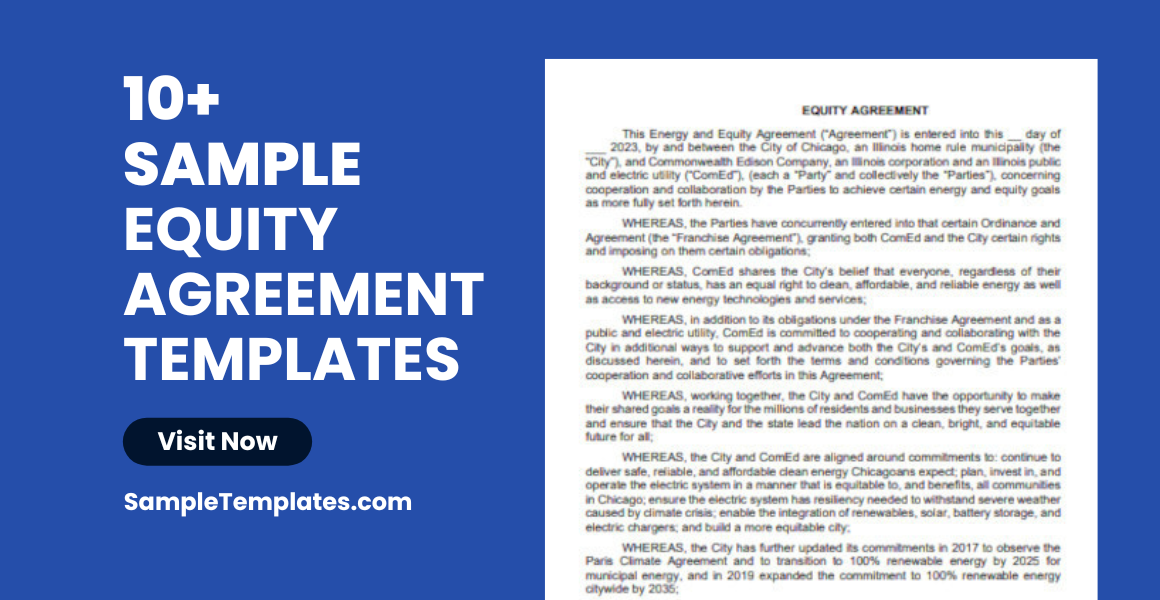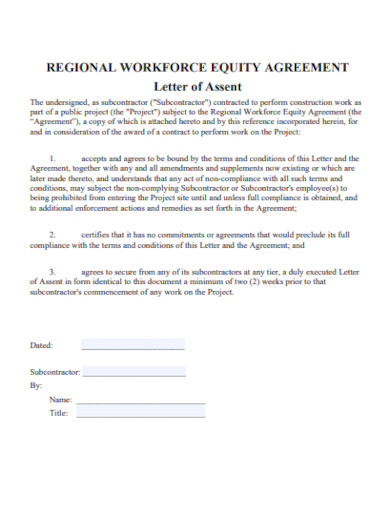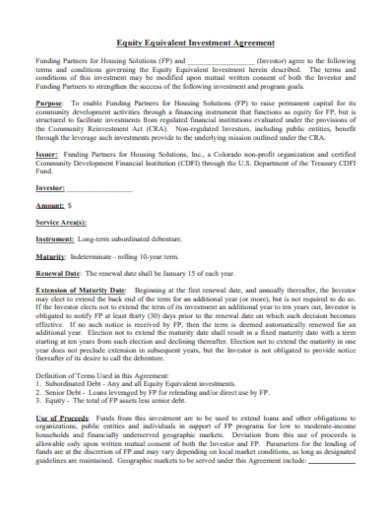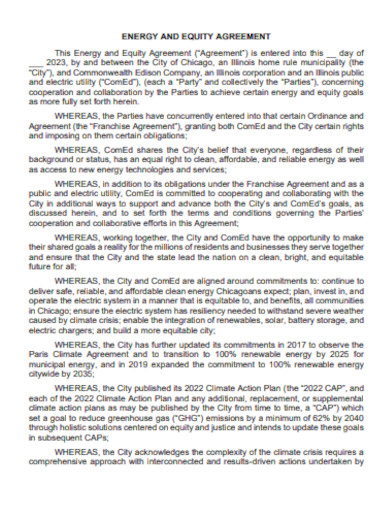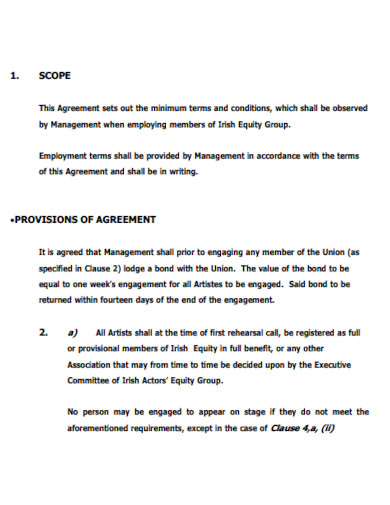10+ Equity Agreement Samples
1. Sample Equity Joint Venture Agreement Template

2. Sample Startup Employee Equity Agreement Template
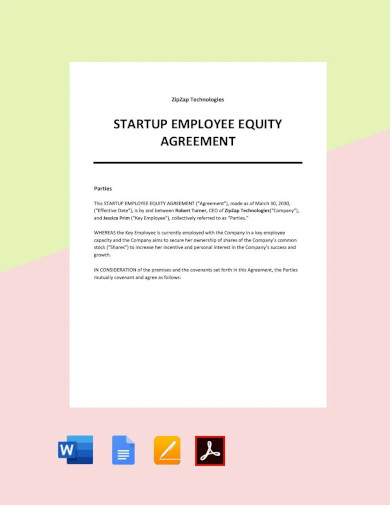
3. Sample Real Estate Equity Share Agreement Template
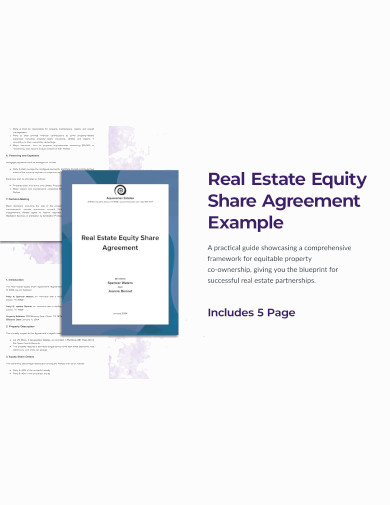
4. Sample Equity Funding Agreement Template

5. Sample Equity Investor Agreement Template
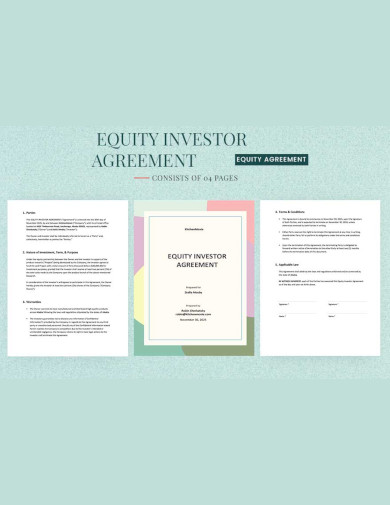
What is a Equity Agreement?
An Equity Agreement is a legal contract that outlines the terms and conditions related to the ownership of equity in a company or project. This type of agreement is commonly used in business and investment scenarios, where individuals or entities are given ownership shares or stock options in exchange for their investment, contribution, or services. The agreement details the rights, responsibilities, and benefits of each party in relation to the equity they hold. You can also see more templates like Equity Compensation Agreement Samples.
Key Elements of an Equity Agreement
1. Parties Involved
Identifies all parties receiving equity and their roles, whether they are investors, employees, founders, or partners.
2. Equity Details
Specifies the type and amount of equity being provided. This could be in the sample form of shares, stock options, or other equity instruments.
3. Vesting Schedule
Often used in agreements with employees or founders, this sample outlines the timeline over which the equity will be earned or vested.
4. Valuation
Details how the company or project is valued and, consequently, how much the equity is worth.
5. Rights and Obligations
Describes the rights of the equity holders, such as voting rights, dividend rights, and rights to information about the company.
6. Transfer Restrictions
Outlines any limitations on the sale or transfer of equity, which is crucial for maintaining control and stability within the company.
7. Buy-Sell Provisions
Details the conditions under which equity can be sold or must be sold back to the company, such as in the event of a member leaving the company or passing away.
8. Dispute Resolution
Includes mechanisms for resolving any disagreements or disputes related to the agreement.
9. Dilution Provisions
Addresses how the equity ownership percentages might be affected by future issuance of additional shares.
Uses of an Equity Agreement
- Startups and Business Partnerships: Used to allocate ownership to founders, investors, and key employees.
- Employee Compensation: Often used to attract and retain talent by offering stock options or shares as part of compensation packages.
- Investment Deals: Outlines the terms under which investors receive equity in exchange for funding.
6. Sample Equity Lease Agreement Template
7. Sample Equity Subcontractor Agreement Template
8. Sample Equity Equivalent Investment Agreement
9. Sample Equity Agreement Template
10. Sample Employee Equity Agreement Template
How do you Write an Equity Agreement?
Writing an equity agreement involves several key steps to ensure it’s comprehensive, clear, and legally binding:
- Identify the Parties: Clearly state the names and details of all parties involved, including investors, shareholders, and the company.
- Define Equity Details: Specify the type and amount of equity being offered, such as shares, stock options, or other forms of equity.
- Outline Vesting Schedule: If applicable, include a vesting sample schedule that details when the equity will be fully owned by the recipient.
- State Valuation: Mention how the company is valued and, consequently, the value of the equity being distributed.
- Detail Rights and Obligations: Describe the rights of the equity holders, including voting rights, dividend entitlements, and access to company information.
- Include Transfer Restrictions: Specify any limitations on selling or transferring the equity to protect the company’s interests.
- Add Buy-Sell Provisions: Outline conditions under which equity can be sold or must be repurchased by the company, such as in case of an employee leaving.
- Incorporate Dispute Resolution: Include terms for resolving any potential disputes related to the agreement.
- Address Dilution: Explain how the ownership percentages might change with the issuance of additional shares in the future.
- Legal Compliance: Ensure the agreement complies with relevant laws and regulations.
- Review and Signatures: Have all parties review the agreement and sign it to make it legally binding. You can also see more templates like Equity Sharing Agreement Samples Samples.
What is an Equity Finance Agreement?
An equity finance agreement is a contract where investors provide capital to a company in exchange for ownership shares or stock, representing a stake in the company’s equity. This type of agreement is commonly used to raise funds for business operations, growth, or expansion.
Who Manages Equity Agreements?
Equity agreements are typically managed by the company’s legal team or an external legal counsel specializing in corporate law and finance.
How are Equity Agreements usually Managed?
Equity agreements are usually managed through careful record-keeping, regular legal reviews, and compliance with relevant laws and regulations, often overseen by the company’s legal and finance teams.
In conclusion, an equity agreement is a critical document in business and investment contexts, as it legally defines the ownership structure and the rights and responsibilities of each equity holder. It’s essential for ensuring clarity, fairness, and legal compliance in any arrangement involving equity distribution agreements.
Related Posts
FREE 10+ Mentoring Agreement Samples In MS Word | Apple Pages | PDF
FREE 10+ Partner Agreement Samples In MS Word | Google Docs | Apple Pages | PDF
FREE 10+ Individual Agreement Samples In MS Word | Google Docs | Apple Pages | PDF
FREE 10+ Strategic Agreement Samples In MS Word | Google Docs | Apple Pages | PDF
FREE 10+ Producer Agreement Samples in MS Word | Apple Pages | PDF
FREE 10+ Grant Agreement Samples In MS Word | Apple Pages | PDF
FREE 8+ Meeting Agreement Samples in MS Word | Google Docs | Apple Pages | PDF
FREE 10+ Community Agreement Samples In MS Word | Google Docs | PDF
FREE 8+ Real Estate Option Agreement Samples in MS Word | PDF
FREE 10+ Call Option Agreement Samples In MS Word | PDF
FREE 10+ Advertising Agreement Samples In MS Word | Google Docs | Apple Pages | PDF
FREE 10+ Car Agreement Samples In MS Word | Google Docs | Apple Pages | PDF
FREE 10+ Horse Agreement Samples In MS Word | Apple Pages | PDF
FREE 10+ Option Agreement Samples In MS Word | Google Docs | Apple Pages | PDF
FREE 9+ Project Management Agreement Samples in DOC | PDF
